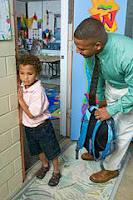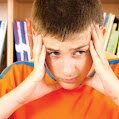Repetitive Routines and Rituals in Kids with Autism Spectrum Disorder [ASD]

Some kids with ASD [High-Functioning Autism] develop a resistance to (or fear of) change, that then involves being rigid in their approach to their environment. Insistence on sameness, routines and rituals begin. For example: Particular silverware and plates must be used or the ASD youngster refuses to eat or drink. Objects may be stacked or lined up in a repetitive manner. Certain routes must be followed to and from familiar places. Certain items must be placed in particular places and not moved. Confusion about coping in a world that is overwhelming influences this behavior, so the youngster with ASD responds to this uncertainty by being in control of their immediate environment, the objects in that environment, and the people in it. Repetitive motor mannerisms may occur when some kids are excited, anxious, or worried. For others, sensory sensitivities and physical enjoyment may drive repetitive jumping, arm flapping, twiddling of fingers in front of their eyes and cover




